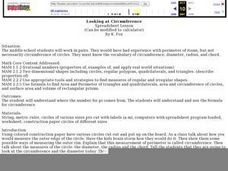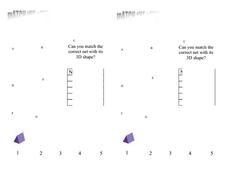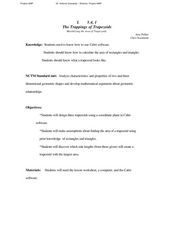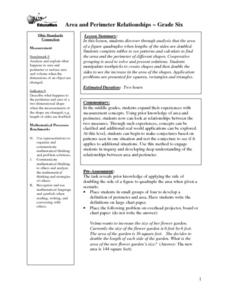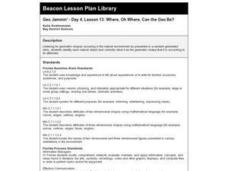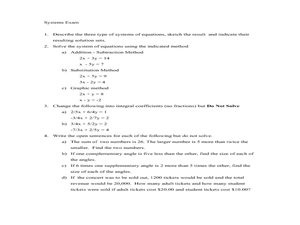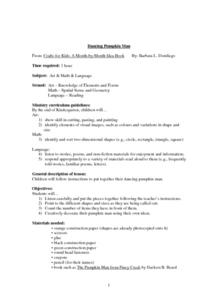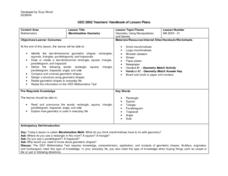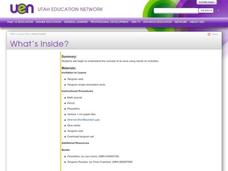Curated OER
Looking at Circumference
Young scholars understand where the number for pi comes from. They understand and use the formula for circumference. Students measure the circles given out and the diameters of those circles and record the results on their worksheet.
Curated OER
Platonic Solids
Students identify different types of polygons. In this geometry lesson, students differentiate between convex and regular shapes. they identify the names of two and three-dimensional objects.
Noyce Foundation
Which is Bigger?
To take the longest path, go around—or was that go over? Class members measure scale drawings of a cylindrical vase to find the height and diameter. They calculate the actual height and circumference and determine which is larger.
Curated OER
Match The Nets
In this math learning exercise, students match the drawings that are in pieces in order to create three dimensional geometric figures. They match the nets with the shapes.
Curated OER
Second Grade Geometry
In this second grade geometry worksheet, 2nd graders answer 10 multiple choice questions about geometric shapes, with the answers available online.
Curated OER
The Trappings of Trapezoids
Students define trapezoids and their shapes. In this geometry lesson, students calculate the area of a trapezoid and a parallelogram. They use Cabri software to make investigations.
Curated OER
Inscribed Quadrilaterals and Parallelograms
Learners differentiate between inscribed quadrilaterals and parallelograms. In this geometry lesson, students identify the shaped of the polygons when it is inscribed inside of a circle. They calculate the missing angles of the inscribed...
Curated OER
Area and Perimeter Relationships
Sixth graders explore the relationship between area and perimeter. After discovering the definition of perimeter, 6th graders work together to create designs for a flower bed. They observe that the perimeter remains constant even...
Curated OER
Mother Nature Pattern Maker
Students in a teacher education program enhance their awareness of patterns. They discover how to support their students in developing this skill in mathematical terms. They role play the role of a K-2 student and collect images from...
Curated OER
Diagonals to Quadrilaterals II
Pupils identify the properties of different polygons. In this geometry lesson, students find the slope of a line and calculate the distance between two lines. They differentiate between similar and congruent polygons.
Charleston School District
Applications of the Pythagorean Theorem
Use patterns to your advantage! The Pythagorean Theorem allows learners to find missing sides of right triangles. Problems include those with both rational and irrational lengths.
Curated OER
Geo Jammin' - Day 4, Lesson 15: Geo Jingo Jivin'
Second graders explore how musical instruments h ave varying geometric shape, and how those geometric shapes correspond to three-dimenaional shapes that students have studied.
Curated OER
Geo Jammin' - Day 4, Lesson 13: Where, Oh Where, Can the Geo Be?
Learners listen to a story "My Crazy Dream" with an intent to identify shapes in ordinary objects. They raise their hands when they've heard an object whose shape they can identify. They discuss their findings.
Curated OER
Measures of Space I: Lengths and Areas
Pupils discover how to measure in one and two dimensional space and calculate how much space any object of a given dimension occupies. After a discussion about dimensions, students work with Zome System Creator Kits to build one and two...
Curated OER
Volumes in 3-D
In this geometry activity, 11th graders calculate the volume of there dimensional shapes using the formula for cylinders. They are given the height and the base and asked to calculate the volume. There are 4 problems.
Youth Education Services
Relating Volume in 3D Objects with Ten Problems
A fabulous four-page assignment explores volume formulae for rectangular prisms, cylinders, cones, and pyramids. Pupils apply the formulas to solve problems, match diagrams to values, and address real-world scenarios. A detailed answer...
Curated OER
Dancing Pumpkin Man
Students listen carefully and put pieces together following the teacher's instructions. They point to the different shapes and sizes as they are being called out and count the number of items they have in front of them. They decorate...
Curated OER
Cones, Cylinders, Spheres
Students classify polygons by name and shape. In this geometry lesson, students identify the lateral surface of each conic. They differentiate between cones, cylinders and spheres.
Curated OER
More Prisms/Nets
Students calculate the volume and surface are of three-dimensional shapes. In this geometry lesson, students use the nets to prove their calculations of shapes. They identify the different parts of a solid using the nets.
Curated OER
Measurement
Seventh graders measure surface area. In this geometry lesson, 7th graders find the surface area of various geometrical shapes. Using a computer program, students compute the area of 2-D and 3-D shapes. Students use...
Curated OER
Investigating Nets and Polyhedra
Fifth graders create a net for a given polyhedron. They determine the corresponding polyhedron for a given net. Students investigate several polyhedra (cube, tetrahedron, and one of their choosing) and their corresponding nets. They...
Curated OER
Marshmellow Geometry
Students explore a variety of geometric shapes, name them, and list their characteristics. The shapes are transposed into structures and checked for accuracy.
Curated OER
Volume, Surface Area for Rectangular & Triangular Prisms
Seventh graders explore the concept of rectangular and triangular prisms. In this rectangular and triangular prism lesson, 7th graders identify various prisms as triangular or rectangular. Students discuss the various shapes of bases...
Curated OER
Area
Students use different shapes that represent tangrams to determine the area of a space. In this area lesson plan, students trace shapes and have their partners determine the area of that shape.
